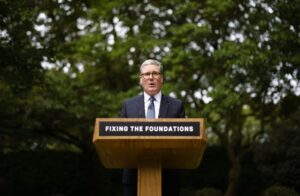It should not be this bad, this early. Nowhere near. And yet it is — it really is. For the Labour Party, barely two months into government, preparing for conference, it is time to panic.
While there is an understandable instinct to downplay the accounts of Downing Street infighting over who gets paid what and who sits where, on this occasion, the reality is worse than the briefings. Inside No.10 the atmosphere is grim: factious, paranoid and — crucially — un-led. The briefings pouring out are not merely froth, but the scum on the surface caused by the panicked churn of an unprepared government underneath. The scale of the disharmony is unprecedented so soon.
Some of the unhappiness is residual from opposition, when a sense of distrust seeped into Labour HQ as Gray attempted to assert more control in preparation for government. The smallest hint of a negative briefing would throw the operation into panic: fingers would be pointed, information withheld and the circle around Starmer tightened. Loyal Labour aides suddenly found themselves on the wrong side of an invisible divide. They resented it — and the person they blamed for building it. Yet there was still a collective mission binding them together: victory.
Since entering government, the situation has deteriorated with extraordinary speed. And rather than dreaming big thoughts about how it will succeed where others failed, No.10 is already drifting acrimoniously into the kind of cynical weariness usually associated with a second term government.
Part of the story is certainly political: Labour’s grim inheritance has forced it to face the kind of “difficult decisions” few in the party want to impose. And the smell of cronyism following the huge donations from the millionaire peer, Waheed Alli, has also been dispiriting. But speaking to those who have witnessed the disorder within No.10, even this account glosses over the scale of the problems affecting the Starmer operation.
Whether Sue Gray is paid a few thousand pounds more than the Prime Minister or a few thousand pounds less does not change the structural challenges facing Britain, which remain extraordinary in their scale and depth. Tackling these requires a government united behind a coherent strategy with capable individuals supported by a system that can deliver what is necessary. Little of that exists at the moment. Those I spoke to told me there was a startling lack of togetherness in the team around Starmer. Each of the main figures close to him — Sue Gray, Chief of Staff; Matthew Doyle, communications director; Morgan McSweeney, campaign director; and Vidhya Alakeson, political director — are impressive, but they are not a band of brothers who have each other’s back. Instead, they reflect a group of individuals, united by their personal loyalty to the Prime Minister more than the coherence of their politics.
In this respect, Starmer’s Downing Street operation has an uncanny resemblance to Boris Johnson’s, which operated more as a court, in which the inhabitants jostled for position in front of the king. It should be a political project with a burning mission. The nagging worry today is that there is a similarly gaping ideological hole in the centre of the Labour project as there was with Johnsons.
True, the party was disciplined in opposition, pursuing its mission to move away from the Left with remarkable success. But such was the extent of this challenge, that it dominated the Starmer project. It was the Starmer project. To win power, the party had to show the electorate it had changed; to do so, it had to make the difficult decisions it made on spending, welfare, antisemitism and candidate selection. But did they ever come up with a coherent project for government itself? If so, it has not yet emerged.
“There’s more than an element of ‘catastrophic success’ about it all,” as one official put it to me, a reference to the calamitous consequences of America’s victory in the 2003 Iraq war. Before the invasion it was widely expected that the Iraqi Republican Guard would put up a dogged fight in defence of their leader. But when the battle came, much like the Tories at the last general election, they deserted the field. In the initial euphoria of the American advance, a corporal clambered upon the giant statue of Saddam Hussein in the middle of Baghdad and hung the Stars and Stripes. It was “mission accomplished”. The statue was toppled and with it, the old regime. But then came the looting, anarchy and, eventually, civil war as the country was sucked into a vacuum of authority that had been opened up by the invasion. The Americans had won, but did not know what to do.
Similarly, Labour were not supposed to win this big, this quickly. But they did and now they have to figure out what they are in government to do, and who will do it.
“The problem is that you’ve got a whole lot of people without a leader,” one senior party figure told me. “No-one is in charge.” Stories are leaking out of meetings packed with the smartest brains in the operation but no decisions being taken because there is no leader. Morgan McSweeney, the man who masterminded Starmer’s rise to the premiership, is not as powerful inside the government as he was outside. There are now rival centres of power: Sue Gray, the gatekeeper of the system; the government machine itself; and, of course, the departments.
Much of the blame for the dysfunction in No.10 has, so far, focused on Gray. She has been compared by various people to Hilary Mantel’s Thomas Cromwell in Wolf Hall, dominating through proximity to power and her reputation as a Whitehall fixer. She is, one senior Labour figure told me, “the last person to whisper in Keir’s ear”. Another said she was “the most political person I’ve ever met”. Among McSweeney’s supporters, there is a concern that he is losing a quiet battle for supremacy with Gray who is using her decades of experience at the heart of government to assert control. McSweeney in contrast is having to learn on the job.
Gray has certainly become the most important cog in the Downing Street machine: Starmer’s eyes and ears, translating his instructions to the system, and the system’s recommendations to him. With Simon Case sidelined, she is acting as more than simply a chief of staff. Many I spoke to said she simply cannot do everything she is trying to do. The system is buckling under her attempt to try. Yet those people also said it was too easy to blame Gray. “There are problems with Sue, of course,” one figure told me, “but the central problem is that people don’t really know what Keir wants.”
And here is the real problem at the heart of the government chaos. A prime minister’s chief of staff is only as powerful as they are allowed to be. Starmer is unusual as a Prime Minister in his lack of political experience, and therefore has tended to rely and follow his advisers in a way Blair or Brown did not. In opposition, McSweeney was central to every major strategic decision. In government he must share this with Gray. Yet, it is far from clear that Gray shares McSweeney’s deepest instincts, which are far more attuned to the conservative feelings of the country on questions of migration, welfare, criminal justice and patriotism than any member of the Government — and, indeed, the Prime Minister.
The nagging worry from those sympathetic to McSweeney’s attempts to refashion Labour as a more provincial, national party of government — as opposed to the liberal wing of middle-class England — is that he is battling forces too powerful for him to overcome: the instincts of the parliamentary party, Whitehall and Starmer himself. So far, the Labour Party has authorised a mass release of prisoners, cut pensioner benefits and accepted the closure of Scotland’s last oil refinery. None of these evidence points suggests a strategic shift to a new, “blue” Labourism intent on ending decades of stale consensus.
All of this makes this week’s Labour Party conference in Liverpool particularly important. No longer a great celebration of victory, as Tony Blair’s first conference as prime minister was seen in 1997, but a gathering to define the purpose of the government and with it, finally, impose some order and authority over the warring operation that is supposed to be in charge.
There is a concerning warning for what happens when such briefing wars run out of control: Boris Johnson. When the briefings started against Dominic Cummings, it was long before they spread throughout the government. Labour has been warned.
This government is drifting and those inside the engine room know it. It is absurd that after two months we should be talking about a reset, but that is what is required. A government must pull in the same direction, bound together in the belief that the pain of the voyage will be worth it. Right now they just seem lost and mutinous.
Disclaimer
Some of the posts we share are controversial and we do not necessarily agree with them in the whole extend. Sometimes we agree with the content or part of it but we do not agree with the narration or language. Nevertheless we find them somehow interesting, valuable and/or informative or we share them, because we strongly believe in freedom of speech, free press and journalism. We strongly encourage you to have a critical approach to all the content, do your own research and analysis to build your own opinion.
We would be glad to have your feedback.
Source: UnHerd Read the original article here: https://unherd.com/



